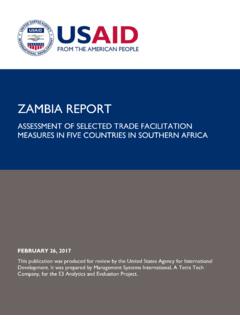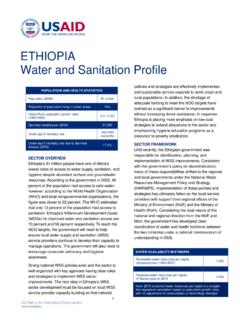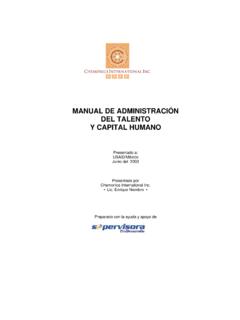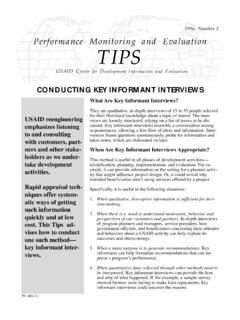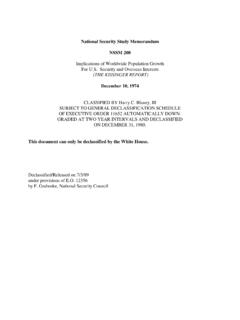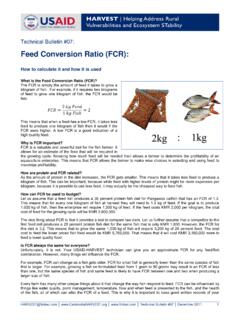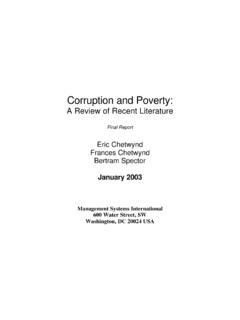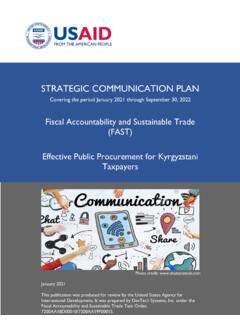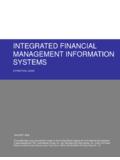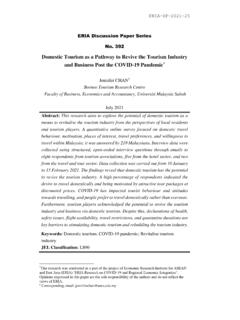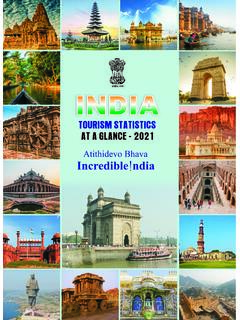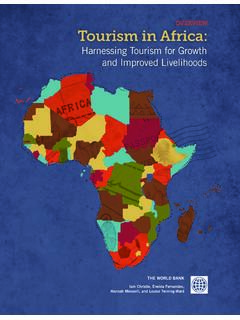Transcription of Tour Operators Manual - United States Agency for ...
1 THE BUSINESS OF INBOUND TOUR Operators Tour Operators Manual March 2007 This publication was produced for review by the United States Agency for International Development. It was prepared by Mr. Alan Saffery, Ms. Michelle Morgan, and Mr. Otgonbaatar Tulga with contributions from Mr. Tim Warren of Adventure Business Consultants. THE BUSINESS OF INBOUND TOUR Operators Tour Operators Manual The author s views expressed in this publication do not necessarily reflect the views of the United States Agency for International Development or the United States Government.
2 CONTENTS 1 1 The tourism 1 2 STRUCTURE OF THE TRAVEL TRADE .. 2 Definition of Terms in the Travel Trade: .. 2 Types of Travel 3 MARKETING .. 7 Marketing 8 Being 9 Destination 10 Marketing Research .. 11 Main Marketing Tools ..12 Trade 12 Brochures and Printed Materials .. 17 Websites: .. 19 4 PRODUCT DEVELOPMENT .. 23 Developing a Product ..23 Operations and 23 Key Issues for New Companies .. 23 5 WORKING WITH OUTBOUND 24 First Do Homework ..24 Getting in the 25 Establishing 25 Building Relationships.
3 25 Building Relationships ..25 Tips .. 25 Unpleasant Surprises .. 26 Continuous 26 6 LEARNING TOOLS .. 27 Section 1: Travel Research 27 Section 2: Market Segments and Market 29 Section 3: Product 45 Section 4: Operations Workflow and Management .. 54 Section 5: Gap Analysis Tool .. 59 Section 6: Sample Documents .. 60 1 INTRODUCTION This Manual was designed as a reference and toolkit accompanying a training course for companies that have newly begun an inbound tour operator business or are considering starting one.
4 If you do not have much background in the travel business, parts of this Manual will be difficult to understand or use without some introductory level training. Contact the Association of Croatian Travel Agencies abut information on attending a course for new tour Operators . The course and these materials should help new inbound tour Operators gain a better understanding of: 1) The structure of the international travel industry, trends in specialty travel and new product demand; 2) Market segmentation, using specific information on traveler interests, motivations and expectations, identifying potential market niches and buyers.
5 3) Steps of new product development in organizing and selling new high value niche market tourism products. 4) Sales and distribution channels, and developing strategies for their effective use Running a tourism business, as you all know, is complex. It is not possible to include within this publication everything that a tourism director or manager needs to know. It is not designed to be an introduction to the global tourism industry. Nor is it designed for those tour Operators and travel agents involved in domestic and outbound tourism , although some of the contents may be relevant.
6 Its aim is to provide a few tips to lead to a more successful business. The tourism Business The role of the tour operator is to essentially sell accommodation, transport, activities and transfers in a combined all-inclusive package. The Tour Operators product is different to that sold by other businesses in many ways and understanding this will go a long way to being successful. 1. What you are selling is an intangible product that must be bought blind because it cannot be seen, touched or experienced by the consumer before use.
7 Instead, tour Operators prepare brochures which represent their products in words and pictures. These brochures cannot accurately give an impression of how any one particular client will experience the product, so sellers are often described as selling dreams. Buying a holiday is like buying a bar of chocolate; only memories are left after the product is consumed. 2. You are selling a discretionary product, meaning that the clients do not have to buy it in the same way that they do food or fuel.
8 When finances are tight or during a recession, they may choose to spend their money that would have gone on a holiday on other consumer durables such as a compact disc player or new washing machine. 3. It is not a heterogenous product. You could buy a refrigerator like your neighbor s and expect it to look identical and operate in exactly the same way, but holidays are by their very nature varied. Anyone coming to Croatia on a food and wine tour will have a different experience whether they come in July or October, even if they went with the same operator , stayed in the same hotels and ate at the same restaurants.
9 4. It is a perishable product. Holidays are only saleable up to the date of the flight departures, especially if you organize fixed date trips. 5. Package holidays suffer from inseperability. The behavior of everyone involved in the product, from the hotel porter to the vehicle driver can have an effect on the outcome of the experience. If we purchase a washing machine, our enjoyment of the product will not be reduced by an irritating plumber who installs it. 2 STRUCTURE OF THE TRAVEL TRADE The travel industry is highly structured, and businesses within the industry tend to specialize in one or a small number of functions driven by their core business.
10 Understanding the structure of the travel trade is important for a company in developing its core business strategy, making marketing decisions, and investing for growth. The structure of the travel trade is largely driven by how consumers travel and how they identify and select the travel services they purchase. As we review the most widespread types of businesses in the travel trade, it is useful to keep in mind some common distinctions made when describing travel companies and their markets.
